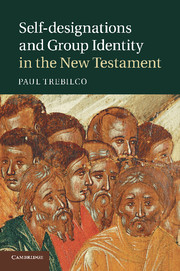Book contents
- Frontmatter
- Contents
- Preface
- Chapter 1 Introduction
- Chapter 2 Brothers and sisters – ἀδελφοί
- Chapter 3 The believers
- Chapter 4 The saints – οἱ ἅγιοι
- Chapter 5 The assembly – ἡ ἐκκλησία
- Chapter 6 Disciples – μαθηταί
- Chapter 7 The Way – ἡ ὁδός
- Chapter 8 ‘Christian’ – Χριστιανός
- Chapter 9 Conclusions
- Bibliography
- Selected author index
- Subject index
- Index of texts
Chapter 9 - Conclusions
Published online by Cambridge University Press: 05 December 2011
- Frontmatter
- Contents
- Preface
- Chapter 1 Introduction
- Chapter 2 Brothers and sisters – ἀδελφοί
- Chapter 3 The believers
- Chapter 4 The saints – οἱ ἅγιοι
- Chapter 5 The assembly – ἡ ἐκκλησία
- Chapter 6 Disciples – μαθηταί
- Chapter 7 The Way – ἡ ὁδός
- Chapter 8 ‘Christian’ – Χριστιανός
- Chapter 9 Conclusions
- Bibliography
- Selected author index
- Subject index
- Index of texts
Summary
This book has investigated the key self-designations used by the earliest ‘Christians’. Here I will discuss the implications of this study for our understanding of New Testament communities.
The way key self-designations were used
Apart from Χριστιανός, the key self-designations that I have studied are all ‘insider-designations’ which would have been used to designate other members of the group when speaking within that group. They enable us to see the significance of various facets of early Christian identity. That ἀδελφοί is the most common and most widely distributed term of address and self-designation indicates the importance and closeness of the early Christian communities and the significance of the familial ethos for these communities. This can be seen to be related theologically to the work of Christ who is ‘the first-born among many brothers and sisters’ (Rom 8:29), but is also related to the fact that the communities met in each other's houses and used other familial metaphors.
Information
- Type
- Chapter
- Information
- Self-designations and Group Identity in the New Testament , pp. 298 - 314Publisher: Cambridge University PressPrint publication year: 2011
